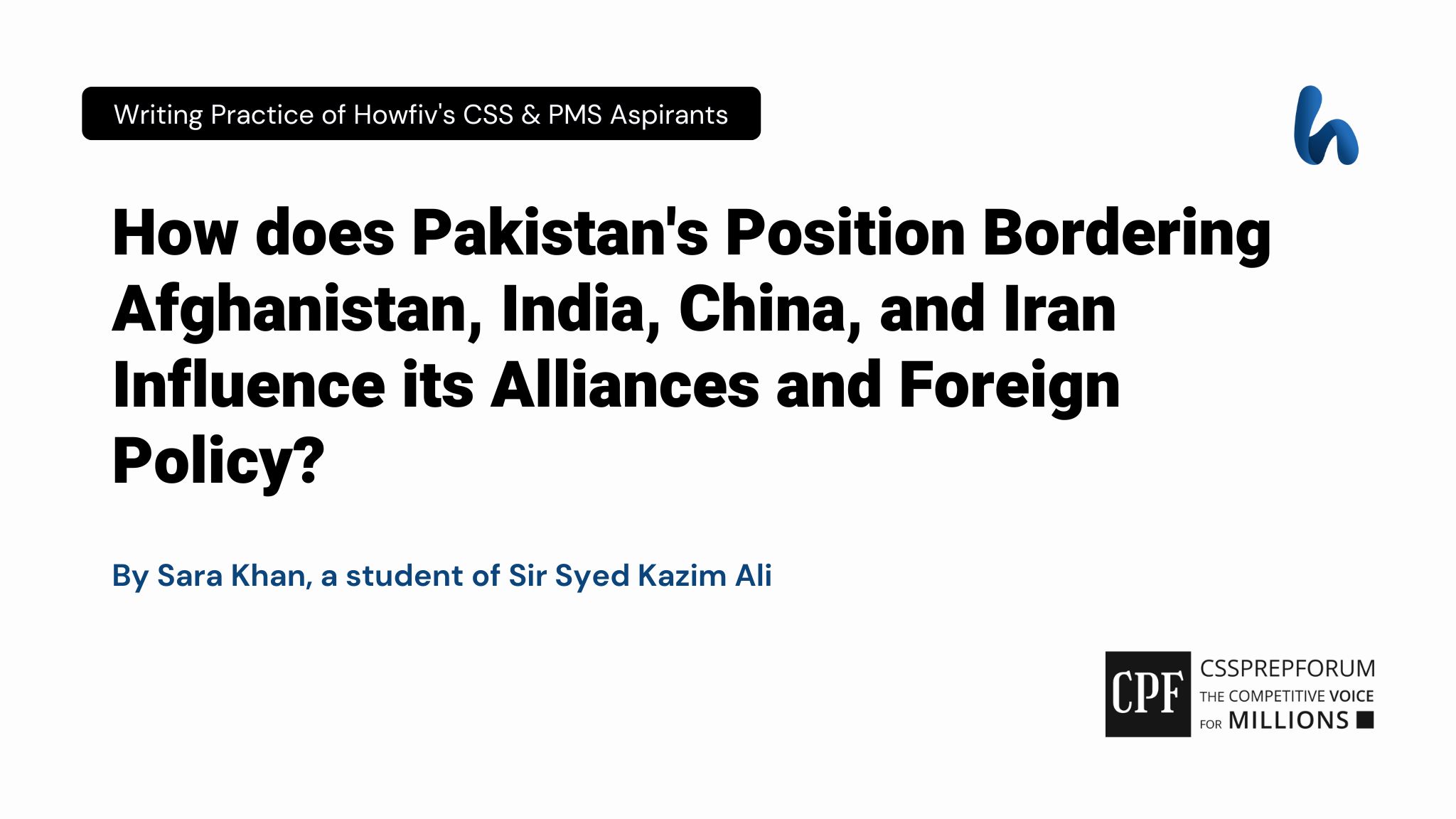CSS Solved Criminology Past Paper 2024 | Crime as a Social Problem

Question Breakdown
In this question, there are three main parts to be discussed, including the concept of crime, crime as a social problem, and the perception of crime as a social problem varying across societies. The examiner has demanded the proper explanation of crime as a social problem, in which one ought to delineate the various individual and social factors behind crime. However, in order to secure good marks in criminology, giving a proper definition of concepts like crime is crucial. Furthermore, the explanation of crime as a social problem with the help of relevant theories and examples will enhance the quality of one’s answer. Another important part of the question concerns the perception of crime as a social problem in different societies. To explain this part, one can mention the historical perspective of crime and the influence of political ideologies as well as media on the perception of crime in the modern era.
Outline
1-Introduction
2-Defining the concept of crime
3-Types of Crime
4-Crime as a social problem
- ✓Individual and psychological factors
- ✓Family factors
- ✓Economic deprivations
5-Perception of crime as a social problem varying across different societies
- ✓Historical perception of crime
- ✓Influence of political ideologies on perception of crime
- ✓Influence of media on perception of crime
- ✓Ever-changing perception of crime
6-Critical Analysis
7-Conclusion

Answer to the Question
Introduction
Crime is human conduct in violation of criminal law that is subject to punishment. It is a form of law-breaking, a symptom of social disorganization, procedural wrong, conventional wrong, public wrong, moral wrong, and scientific wrong. The notion that crime is a social issue highlights the reality that criminal behaviour is influenced by social, political, cultural, and economic aspects of society rather than being the product of an isolated incident. According to this perspective, crime is a symptom of deeper socioeconomic problems like poverty, discrimination, inequality, and a lack of social support networks and cultural standards. Recognizing and addressing the underlying causes of crime is necessary in order to combat it. A variety of interventions may be necessary to address systemic inequalities, such as structural adjustments that improve access to jobs and education, bolstering social support networks that foster community cohesion, and addressing cultural perceptions of crime and violence.
Definition of Crime
Crime has destroyed the social fabric of society and appears in different colours. According to the Structural Functionalist Perspective of Sociology, every aspect of society plays an important role in society. Crime in the proper amount is good for society as it helps to define values and get people to adhere to those values. Emile Durkheim believes that crime is inevitable in any society. Every society has to face the problem of crime and criminality. According to Michael Adler,
“Crime is a behavior prohibited by criminal law.”
Moreover, Paul W. Tapan defines crime as,
“An intentional act in violation of criminal law.”
According to the Black’s Law Dictionary,
“Crime is a social harm that makes it punishable by law.”
Furthermore, Sir Stephen defines crime as,
“An act which is prohibited and forbidden both by law and morals of society.”
Types of Crime
Crime is of various types, including serious crimes known as felonies and misdemeanours, as well as less serious crimes. Some of the crimes are considered immoral as well as prohibited worldwide, like rape, theft etc., known as Mala in se and Mala prohibitum, respectively. In addition, Pakistan Penal Code 1860 defines various crimes. For instance, Sections 499 and 500 of the code highlight the crime against reputation.

Crime as a Social Problem
Henry Thomas Buckle once said,
“Society prepares crimes, and criminals commit it.”
According to the Consensus Perspective of Criminology, the majority of citizens in a society share the same set of values and beliefs. Deviance from these values is considered to be a crime.

Individuals Factors Leading to Crime
According to Sigmund Freud’s Psychodynamic theory, when the desires or id of an individual overpower one’s morals or superego, then one might indulge in violence or aggressive behaviour. Furthermore, individuals suffering from psychological disorders like schizophrenia may practice violence, for instance, lone wolf in the West.
Family Factors Resulting in Crime
Lack of attention from parents, family discords and separation of parents can also inculcate aggression and violence among individuals. According to the Law of Imitation by Gabriel Tarde,
“Every child’s mind is a blank sheet of paper. Whatever he learns is printed on his mind.”
Moreover, according to the Symbolic Interactionist Perspective and Learning Theory by Sutherland, if a father practices violence against the mother in front of the son, then the son might adopt the same behaviour with his wife in future. In addition, if peers of a young individual are indulged in criminal offences or use of narcotics, then one might adopt the same habits.
Unemployment and Economic Deprivation
Unemployment leads to poverty, thus leading to frustration and aggression among individuals. Besides, according to the Relative Deprivation Theory by Robert Tedd Gurr and Samuel Schouffer, when an unprivileged group compares itself with a privileged group and feels relatively deprived, it might lead to conflict, and it is known as fraternatistic relative deprivation. Similarly, individuals also feel deprived, which is known as egoistic relative deprivation. This perceived injustice may relate to economic inequality, political discrimination or other forms of social inequity. For instance, the young populace of tribal areas is easily radicalized and recruited by militant groups because they feel relatively deprived. Conducting terrorist attacks and being part of militant organizations help them not only acquire wealth but also improve their social status.
Perception of crime as a problem varying across different societies
Crime is a dynamic concept that keeps on changing with social changes. It is an act or a failed act. Cultural, historical, and socioeconomic variables can lead to considerable differences in how various societies view crime as a social problem. Some communities may see punishment and deterrence as the main strategies of addressing crime as a result of personal moral flaws. Some communities, on the other hand, might place more emphasis on the necessity of treating underlying socioeconomic issues and encouraging rehabilitation and reintegration of criminals.
Historical Perception of Crime
The history of crime is as old as the first civilization. Originally, crimes were kept as private matters or civil wrongs and were not considered criminal wrongs. One who was harmed sought retribution. According to German law, the ‘Law of Lex Talionies, ‘ which means an eye for an eye, was practised either against the wrongdoer or one’s family. Prior to the 10th century, according to Maitland and Pollock,
“There was no difference between civil wrong and crime.”
Influence of Political Ideologies on Perception of Crime
During the era of the King of Hammurabi, the one who harmed the people of the king was considered as the one who harmed the king. After the introduction of the Social Contract Theory, a king or ruler was chosen by society to protect their rights. Crime and punishment evolved with the emergence of the king and the state. As Jeremy Bentham said,
“Crime and punishment grew from one stem.”
Influence of Media on Perception of Crime
Media is a powerful tool that influences people’s minds and public opinion. For instance, after the 9/11 attacks, the Western media portrayed Muslims as terrorists and spread hate against Islam. On the other hand, if a non-Muslim kills a number of people, then he is portrayed as a mentally ill or a lone wolf.
Crime as an Ever-changing Concept
Crime is a moral or procedural wrong. It is a dynamic and ever-changing concept that changes with the location, culture, and attitudes of people and time. For example, kite flying is a crime in Pakistan but not in India.
Critical Analysis
Crime refers to harmful behaviours such rape, theft, assault, substance abuse or violence etc. Though it is disruptive for society, various issues like economic deprivation, discrimination, lack of education and family discords lead to the violent or criminal behaviour of individuals. Despite social causes, as indicated by Emile Durkheim and Social Learning Theory etc., criminal behavior is also inherited, as delineated by Charles Goring. Furthermore, according to the Holy Three of Criminology, including Lombroso, Ferri and Rafaelle Gruffalo, criminals can be distinguished from law-abiding citizens due to their physical characteristics. Besides, Cesare Beccaria and Jeremy Bentham believe that individuals commit crimes for their own benefit after conducting a cost-benefit analysis. Nonetheless, such behaviours exacerbate the existing inequalities and marginalization, thus hampering the development of a society. Therefore, in order to eradicate crimes from society, understanding the underlying causes and effective law enforcement are paramount.
Conclusion
To cap it all, crime is a form of social harm that is a violation of the law and the interests of people. Crime is a social problem because it is a symptom of various ills of society, including discrimination, discords, deprivation, poverty, etc. Several civilizations have diverse ways of tackling crime and its underlying causes because of the intricate interaction of social, cultural, political, and economic elements that form the view of crime as a social problem.













